- Home
- Elizabeth Bear
Scardown jc-2 Page 6
Scardown jc-2 Read online
Page 6
But they have gravity. The captain nodded, still impassive, and the junior officer's hands played over his control panels. Xie Min-xue folded his own hands in his lap and recalled lines of T'ang dynasty poetry to pass the time. Have you not seen, lord, near the Kokonor, the ungathered bones of the long dead soldiers? New ghosts whisper while the old ghosts weep: you can hear them in the empty passage of the rain.
He couldn't wait until his stultifying duty shift ended, and he could put in his practice hours on the simulators and then read himself to sleep in what passed for the privacy of his coffin-bed. Or find Paiyun and the medics or the other off-duty pilots for a game of mah-jongg, go, or chess.
The Huang Di rose in soundless pursuit of her rival, slipping ghostlike away from the embrace of Earth's gravity and into the caress of the stellar wind. The screens and holograms showed the character indicating Earth “below” and “behind” Min-xue's ship. Somewhere on that whirling globe was Min-xue's mother, his sister, the girl he had intended to marry. Before he'd been subjected to the pilot's modifications that made him flinch away from the simplest touch.
What the Westerners did to their pilots was worse. The clinicians and technicians said the Canadians were afraid to trust their pilots with a full nanite load, or to make enough of them to allow adequate rest between shifts. The clinicians said that the Canadians severed limbs and replaced them with cybernetic appliances, implanted destruct codes in the pilots' software, addicted them to performance-enhancing drugs so that they could bear the endless workload, and so they could be more easily controlled. The Canadians and their corporate masters did not have the moral certainties of post-Communist and neo-Confucian patriotism to guide them; they were ideologically flawed, and their rapacious ways, so similar to those of the Americans, were a large part of the reason behind the poverty and privation that Min-xue had known so well as a child.
They must not be permitted the conquest of space, he thought. If it costs all our lives, this border must be defended. Min-xue lifted his eyes from the world spinning there in the blackness and trained his gaze at the screens showing the space beyond the Huang Di's nose.
Forward, he saw only darkness pricked out in ten thousand glittering lights, and the minute form of the Montreal, magnified on a side screen to reveal the silhouette of a gawky, wing-spread, leg-trailing crane. Iron hinges, iron barriers Fettered the passes, Mighty banners, five fathoms long, Battered the double gatesem>…
Xie Min-xue, you are a long, long way from home.
Monday 6 November, 2062
HMCSS Montreal processor core
12:13:32:07–12:13:32:13
The being who jokingly called himself the ghost of Richard Feynman would have grinned from ear to ear, if he'd had a body to do it with. A physical body with lips and teeth, that is. Because after five days of hard and subtle work, incontrovertibly — he had a shape, a skin. Pulse of coolant through his veins. Sunlight painting his hide. Room to stretch, to resume interrupted operations, to spawn processes suspended for the duration of his quiescence in Jenny's limited wetware. Tug of gravity at his boots and the whisper of Jenny's presence at the back of his consciousness — not the same way it had been when he was riding her implant, but as one of a countless multitude of voices — most of them incomprehensible. Among them, he could pick out relays from the Chinese pilots, infected like Jenny with an imperfectly understood technology, although he could sense a difference in their nanotech and that of the allied Canadian and Unitek agencies. He couldn't control the Chinese nanotech — or the alien originals — as he could the modified Canadian bugs. It was as simple as being on the inside of one code-set and the outside of the others, but it worried Richard.
The contagion — the gift of the nanotech — worried him more. It stretched his credibility to imagine such gifts given purely out of munificence.
I cannot assume anything about the aliens. It's the rankest kind of anthropomorphizing to assign human motivations to another species. And I have to learn Chinese.
Why is it always the bureaucrats who wind up deciding how the technology is applied?
Richard stretched himself through the ship's systems, subsuming its essential functions, feeling its heartbeat and its breath. The solar wind pressed his webbed wings forward, tickled his solar collectors. A nanosecond after he'd left Jenny for the ship, he'd realized with annoyance that there was no physical way for him to control the ship's trajectory. The hardware interlocks had been intentionally designed to keep navigation out of the AI's control. But I've got access to life support. The perfection of government logic.
He grinned internally, and started checking sensor feeds to get a solid look at the earth through his “own” eyes.
The grin didn't last. Satellite images and the Montreal's own infrared, visual light and water-vapor records painted a distressing picture. He had the data, of course — temperature spikes and dips, eroding of the protective layers of the atmosphere, algae bloom and die-off. The images of the dust storms over Mongolia and the U.S. Southwest, the stagnant Atlantic with its failed thermohaline cycle, and the rising ocean levels were sobering enough — and he'd long ago retrieved them from news feeds.
It was somehow different, seeing it all at once.
1200 Hours
Monday 6 November, 2062
HMCSS Montreal
Under way
Gabe chewed his thumbnail as he watched Jenny's body slump, limp as a trusting kitten, into the embrace of her black leather chair. He stayed at the back of the little assemblage, trying not to draw attention, trying not to count each breath.
Something flashed in his peripheral vision, drawing his eye. Blink. Blink. Lieutenant Koske jostled his arm as he turned and then gave him a dirty look.
Gabe smiled. Morse code: all clear. And kept turning, smiling, intentionally brushing Koske aside so the smaller man had to hop out of the way. Koske's enhanced reflexes made it graceful, more was the pity, but at least Gabe got the satisfaction of another dirty look. You may be an engineered war machine, punk, but I probably saw more combat hours than your whole fucking unit. Just you bear that in mind. Valens stood by a console at the near wall, touching a miniature microphone almost to his lips. He wasn't speaking, currently, just observing the observers, who seemed entranced with the slowly receding blue-green sphere projected on the wall screens. Gabe drew up beside him and waited for the acknowledgment.
A different crop of observers this time. There were children behind him, fifteen, sixteen. Standing on the bridge of an untested starship. This is so fucking wrong, Gabe thought, imagining his own daughter in the place of the girl with Valens's hazel eyes. The other child was a beautiful cocoa-colored boy with a warm, hesitant smile and facile hands. Someone stood behind him in a pinstriped power-suit, ridiculous for space travel: a big man, salt and pepper and an officious nose, wearing a Unitek twenty-five-years pin as a tie tack. And next to him, Alberta Holmes, Unitek research and development VP and Valens's personal little red devil on the shoulder. Not that Valens needed much help.
I must have missed a shuttle from Clarke coming in.
Gabe cleared his throat. “Colonel.”
Haunted silence hung so thick over the bridge that Gabe thought he could hear Jenny breathing. Valens dropped the mike from his lips. “Yes?”
“Excusez-moi,” Gabe said. “I'm going to continue my diagnostics. Do we have a timeline yet for introducing the modified AI into the system?” The one that Ellie and I crippled on Valens's orders. Not to be confused with the whole and complete Richard sending me messages in Morse.
“Go ahead,” Valens said. “Are we on target to do an install tomorrow, if necessary?”
“Yes.”
“Let's look for that. Oh, and Castaign — how's your daughter?”
“Daughters,” Gabe answered, enjoying watching Valens's eyebrows knit together. “Fine, thanks. Genie's doing well on the enzyme therapy. You probably know more about Leah's progress than I do. Don't tell me you don't study the repor
ts.”
Valens tipped his head, raising the microphone again. “Excellent. If all goes well with the install and the dry runs, we'll have you and Casey back on solid ground before the week is out. Just in time for snow back home.”
“Just in time for snow.” Gabe turned away, glanced back. “Long trip to stay only ten days.”
“We have a whole school full of pilots to train.”
Gabe pushed both hands through his hair. “Plan on needing them soon?”
“Can't hurt to be ready,” Valens answered, and waved Gabriel away.
1800 Hours
Monday 6 November, 2062
HMCSS Montreal
Under way
Patricia Valens brought her tray to her grandfather's table and set down bowls of steaming udon and vegetables in broth. Papa Fred's dinner had grown cold from inattention, little flecks of sesame oil dark on the surface. “May I sit with you?”
Papa Fred pushed his work aside and straightened in his chair, smiling. She sat and picked up her fork. “Noodles again.”
“Economy of scarcity,” he said. “They're light, nutritious, and inexpensive.”
“I like it better with pork cutlet.” She grinned and stabbed a carrot, shaking a few drops of broth back into the bowl before she popped it in her mouth. The perpetual tightness in her chest eased at his smile. “Thank you for inviting us.”
He stuffed his hip into his pocket and pulled his bowl closer, lifting it under his chin to scoop up congealed noodles. He didn't seem to notice. After swallowing, he answered, “Good experience. How are your parents?”
“Good.” The lemonade was too sour. She pushed the cup away. “Mom's talking about early graduation again. And sending me to the U.S. for school. Stanford. But Papa Georges came with them to see me off.”
Patricia's grandfather set his bowl down and reached for his coffee, which also must have been cold. She laughed at the face he made. “Did he say anything?”
“He said to tell you to ‘get your ass home in one piece.' Papa—” She caught herself twirling the noodles aimlessly around the tines of the fork and set it aside. “This is a colony ship, isn't it? There's no other reason to make it so big.”
“If we can find a world for people to live on, yes.”
“Are you leaving Earth?” Blunt, out in a rush.
Papa Fred rubbed his upper lip, light catching in his hair as he shook his head. “I'm too old to become a pioneer at my age. You could, though.”
“I wouldn't want to go anywhere without you and Papa Georges.” She put a hand possessively over her grandfather's. His skin felt thin and strangely inelastic, cool. She didn't pull her hand back. “Papa Fred, are you okay?”
“Just not as young as I used to be.” He was looking over her shoulder oddly. He grabbed his handkerchief abruptly and sneezed, and bit down on a swear.
Patricia turned in time to see the tall, edgy master warrant officer — Casey — glance down at her dinner, scowling. She'd been staring. Patricia looked back at her grandfather. “Does that pilot have a problem with me?”
“Casey's probably just curious.” He twirled his fork between his fingers; a clue he wasn't telling her everything. Grown-ups always thought they were so good at keeping secrets.
“Papa, I'm sixteen.”
“Already?” He made a joke of it, and Patricia knew the conversation was over. But she'd seen the loathing in Casey's face, and wondered. If it isn't me, it must be him.
She changed the subject. “When can I start the neural modifications?”
“We'll be picking candidates in the next couple of weeks.” His gaze stayed steady on her face now, and she was glad.
“You're not going to try to keep me from getting wired, are you? I thought you might be kind of funny that I qualified.”
“Proud,” he said. “You know there's only one other girl in the program?”
“I didn't know there were any others. I've only met boys. How come?”
“Boys are more likely to spend their days in front of video games.” He made a tossing-away gesture as Patricia turned her attention back to her dinner. “Pity, as girls your age are much more grown-up and easier to work with. I suspect you'll test high. You're not worried about the surgery?”
“Mostly not. Lieutenant Koske and Master Warrant Officer Casey came through it all right, and I already had the neural VR.” She wouldn't let the apprehension that turned the noodles in her mouth into a gag-worthy lump show in her voice. “And they're older than I am.”
“Yes,” Papa Fred said, his face curiously smooth and his voice soft. “It's much, much safer now. It takes longer than the VR implants, though, and there are still risks.”
Patricia let it turn over in her head for a while. “Would you do it?”
“In a nanosecond,” he answered. “You should finish your supper before it gets cold.”
She's perfectly fifteen, sixteen. On the tall side, heavy fall of shiny brunette hair. I can just see the edges of her interface through it, and I can't stop staring over her shoulder at the paternal little smile Valens is wearing. He catches me at it and I have to look down. I can't take the vindication in his eyes. Yeah, Fred. She's a nice-looking kid. What would you do to somebody who treated her the way you treated me?
Or if it were for king and country, would it all seem okay? It doesn't matter, does it? Not really.
The noodles are too salty. To my enhanced senses the udon is like fat, ropy worms and besides, the Hammer always kills my appetite — and flying the Montreal is exhausting as only something that calls for total concentration can be.
The fluorescent overheads strobing against the back of my eyes make me flinch. Everything's still sharp as etched glass, focused through the lens of the drug. I can pick out every voice in the cramped, crowded mess hall, although I can't quite focus on an individual conversation. I wonder if it's similar to what Richard picks up from the aliens — a whisper of party noise, and no sense at all.
I catch myself rolling the knife between my hands, staring at the lights reflected in the unsmudged blade. I force myself to look away. My edge is fading and I left the bottle in my cabin. I should put it in my locker down by the scrubbers, but Hyperex is a controlled substance. Everybody onboard has to know I have it, and my quarters are more secure.
Every sparkle, every movement catches my attention like a waved hand. I notice the captain at her table, although she usually eats in her cabin. She's entertaining the Unitek brass. I cast one last glance around the room for Gabe — no dice — and get up to ditch my tray.
Marde. Enough of this. I'm going for a walk.
My meat hand is shaking by the time I reach the ring corridor. I stuff it in the pocket of my jumpsuit and keep walking. I hate coming down. Hate hangovers. Hate that feeling that the world is that much closer, sandpaper on bare flesh instead of crystal-smooth and a warm quarter-inch away. I miss Richard in my head, ironic calming company. I walk back toward my quarters. I am not taking another pill.
Not.
I don't need it anymore.
Gabe must still be working. I find my hatchway, let my thumb hover over the lock plate, and jerk it back as if the damned thing were hot. I keep walking. Gabe's quarters are down the hall and “up” a ladder. He gets a side window and slightly lower “gravity.” Weird how our human desire for a view — the deepseated urge to see what might be coming to eat you — outweighs the intellectual knowledge that it's cold and deadly on the other side of the Montreal's metal skin, and the safest place to be is buried in the center of the ship.
I knock on his hatchway, but nobody's home. Out of idle irritation as much as anything, I press my right thumb to the lock plate, an opalescent rectangle of black gel polymer that looks like a mood ring and feels like skin. My tongue clicks against the roof of my mouth when I hear the lock disengage. “Well, how about that.” I wonder if Gabe decided to set me up, or if Richard's taking pity on me, and then I undog the hatch, enter the room, and close it behind me.
Gabe's bunk is made tight and military until I sit down on it and pry my boots off by pressing my toes into the crease above the heel. It smells like him, though: faint musk of his skin, deodorant soap, toothpaste. We've been here almost a week.
I wonder if, back in Toronto, Elspeth's doing the same damned thing I am.
Probably not. She's like a machine, all brilliant edges and devious twists. Slicker than a greased snake, Grandpère would say. And twice as sharp as its teeth. I can't really think of her as a rival, even. We're all, as she told me back on Earth, grown-ups here.
I get through the shakes and the chills wrapped around Gabe's pillow. I'd have to go back to my room for the itty-bitty yellow pills. So harmless. So friendly looking. I've got the self-control to stop myself before I get out the door. If I were alone in my quarters, it might be different.
Gabe's eyes go wide when he opens the door. “Jenny. How'd you get in here?” And then he sees my bloodless face, the way my metal hand strains the fabric on his blanket. He crosses without another stupid, pointless word and pulls me into an embrace.
“You set the lock up for me.”
“Of course I did,” he lies, so I know—Richard. And the listening devices, I hope, don't.
“Hammer?”
“Obvious?”
“We did this once,” he reminds me. And we did. It should have been harder, then. I had more pain. A full-blown addiction. A carcass that felt stuffed full of broken glass. He wraps my shoulders in his big gentle arms and I read muscle under a comfortable layer of fluff. A bear, I used to call him, and he gets more bearlike with every year gone by.
I was a hell of a lot younger the last time.
“Mon ange,” I say into his neck. “It hurts.”
“We're going home in a couple of days,” he answers. “Hang on, Jenny. Hang on.”
He doesn't say what I know: that even on Earth, there will be the drugs, the tests, the training. And it's kids like Leah and Patricia Valens I'm going to be — I hope — teaching things that will get them out of this meat-grinder alive.

 Scardown
Scardown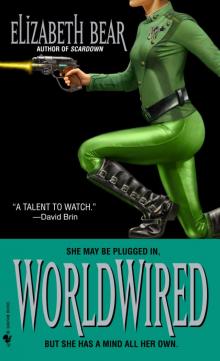 Worldwired
Worldwired Ancestral Night
Ancestral Night Hammered
Hammered The Red Mother
The Red Mother The Red-Stained Wings--The Lotus Kingdoms, Book Two
The Red-Stained Wings--The Lotus Kingdoms, Book Two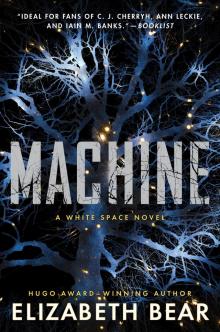 Machine
Machine Some of the Best from Tor.com: 2019 Edition
Some of the Best from Tor.com: 2019 Edition Faster Gun
Faster Gun In the House of Aryaman, a Lonely Signal Burns
In the House of Aryaman, a Lonely Signal Burns Stone Mad
Stone Mad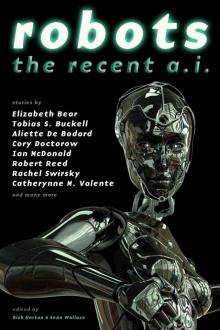 Robots: The Recent A.I.
Robots: The Recent A.I. The Tempering of Men
The Tempering of Men Boojum
Boojum Book of Iron bajc-2
Book of Iron bajc-2 The Year's Best Dark Fantasy and Horror, 2010
The Year's Best Dark Fantasy and Horror, 2010 New Cthulhu 2: More Recent Weird
New Cthulhu 2: More Recent Weird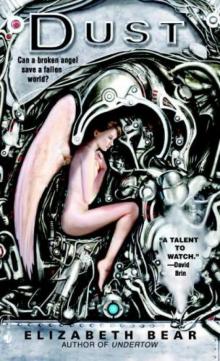 Dust jl-1
Dust jl-1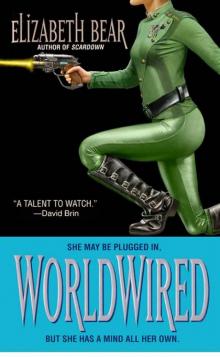 Worldwired jc-3
Worldwired jc-3 An Apprentice to Elves
An Apprentice to Elves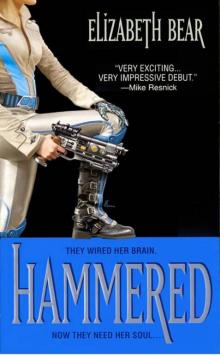 Hammered jc-1
Hammered jc-1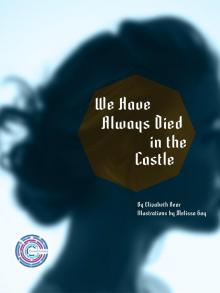 Crowd Futures: We Have Always Died in the Castle
Crowd Futures: We Have Always Died in the Castle Bone and Jewel Creatures bajc-1
Bone and Jewel Creatures bajc-1 Carnival
Carnival Some of the Best from Tor.com: 2012 Edition: A Tor.Com Original
Some of the Best from Tor.com: 2012 Edition: A Tor.Com Original The Stone in the Skull
The Stone in the Skull Scardown jc-2
Scardown jc-2 Hell and Earth pa-4
Hell and Earth pa-4 Undertow
Undertow Mermaids and Other Mysteries of the Deep
Mermaids and Other Mysteries of the Deep A Companion to Wolves
A Companion to Wolves Ink and Steel pa-3
Ink and Steel pa-3